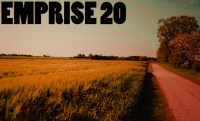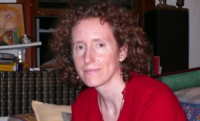Writing Process/E-Publishing/”The”/No Tears For Old Scratch
1. What are you looking forward to in 2010?
I’m looking forward to my new novel, No Tears for Old Scratch, getting out into the world. I worked really hard on it, including the soundtrack (which I’m still finishing up), and I think it’s a big step up for me in terms of the quality of the writing.
2. I found out about you when I read “The” which I found quite funny, and, since I’ve spent more time in the lit-field it’s something I refer back to from time to time for reassurance that someone else recognizes some of the insanity. Talk about the piece. What inspired you?
Since my stories don’t come from my own life or are not based on my personal experiences, I get inspiration from strange places (or at least strange compared to many writers I know). My girlfriend and I had seen an Ellsworth Kelly exhibit that consisted of a series of very minimalist paintings — large black shapes on stark white canvases. My girlfriend, being much more intelligent than I and a somewhat more philosophical thinker when it comes to art, liked the exhibit and appreciated Kelly’s minimalist approach. I’m completely impulsive when it comes to art. If I don’t get an emotional connection to the painting, I can’t get with it. Same with music. Kelly’s work always makes me think of bad paintings they hang up in corporate offices. I don’t find them interesting or even great. Yet, he’s exhibited in large galleries and museums around the world. Shows what the hell I know.
On our way home, we were debating about the exhibit, and I just couldn’t come around to appreciating what Kelly had done, no matter how valiantly my girlfriend tried to explain Kelly’s approach (to have our minds derive certain intrinsic meanings from the shapes on the canvas). This somehow led me to making a joke about how ridiculous the same approach would be in fiction. Out of nowhere I had this idea of a militant minimalist writer, who was getting up at readings and launching into one-word short stories. The ultimate in minimalism! And this writer would hate the audience for not getting it. Over a few glasses of wine the idea expanded. After a while, this writer would even hate words, viewing them as the death of literature. Words were the problem! The sillier the idea became, the more I liked it. And it expanded out from satirizing minimalist art to also mocking a lot of the writers I’ve seen in the past few years who are too focused on experimentation, such as some of the folks who get all jazzed up over the idea of flash fiction revolutionizing literature (more on that below).
3. I noticed on your website you are soundtracking No Tears for Old Scratch, the novel you are working on. How do you intend to incorporate the soundtrack?
When I did the podcast for The Love Book, I needed a music bed as a background for the intros and outros. Since I play guitar and record music, I thought it would be a good idea to use something I already had on hand. Prior to that, I had recorded a dirgey sort of song called “Spanish Moss and Torn Flesh.” How’s that for a ridiculously stupid title? I think my original idea for the song was that it was some guy laying in the grass in Savannah, Georgia, after having been stabbed. He’s looking up at all the Spanish moss in the trees as he’s dying. Don’t ask me where that came from. Seems really over the top and ridiculous now. But I liked the song itself and felt the mood fit the stories in The Love Book. (If you want to give it a listen, you can check out the audiobook podcast here.)
Later on, I kept thinking it would be a great idea to actually soundtrack a novel. I had put together a mix playlist to listen to while writing No Tears for Old Scratch. It included songs by Nick Cave, Entombed, The Reverend Horton Heat, Venom, Clutch. Anything that had the devil in it. I always write to music and a lot of the stories or sections usually have a musical structure to them. An example would be “Taking the Happy Bus on Home” from The Love Book that I always thought of as the “When the Levee Breaks” for the collection, that final epic piece to wrap up the whole album. So as I was writing the new novel, I kept hearing themes or moods in my head for certain sections. I also noticed that I was suddenly writing more songs.
My hope is that the soundtrack can be bundled in with the e-book version and also sold separately as a stand alone album. I’m a big fan of soundtrack music, be it John Carpenter, Akira Ifukube, Goblin, Bernard Hermann, Nick Cave and Warren Ellis, Ennio Morricone, Danny Elfman, Nino Rota, and even RZA. I think it just gives readers another dimension. Some people will give a rat’s ass about it and just want the book. Others might want to listen to the music when they’re not reading the book. And some may just dig the music and could care less for my writing. And of course I can also use it in the audiobook podcast for the new novel. Ultimately, it’s just another way for me to be creative and think of the novel as more than just a novel.
4. Stock question—a writer or text our readers should go track down and read.
I’ll give you one new writer and one old writer I’ve read recently that in some ways go together quite nicely. Both of them have written dark novels that have a suspense framework to them, but they’re really more straight-up lit-fiction in their style with superb prose and characters that live and breathe. I think that’s something a lot of writers lack nowadays. They have characters who are quirky or sad or sick, but they still feel like cardboard cutouts with a few defining traits. It’s very hard for a lot of writers to be Dr. Frankenstein and make their characters actually have blood pumping through their veins. I highly recommend Dan Chaon’s “Await Your Reply.” The novel is very Hitchcockian. Think Vertigo expanded out to a trio of main characters. As for an older author, read any of the Roman Durs by Georges Simenon, especially “The Man Who Watched Trains Go By, “Dirty Snow” and “The Strangers in the House.” Simenon really drags you inside his characters, taking you underneath their skin, so you feel as if you’re standing in the novel with them. And his prose is perfectly taut and punchy. He could say more in a single sentence than most people could in a whole page.
5. Lots of e-publishing talk, some breathless proclamations, many writers taking to the outlet—though there really hasn’t been an aha! moment just yet. Where do you see this going? Is the rumored Apple Tablet going to be the device that gets things moving, or is it just too early to tell with e-publishing?
Well, I’m a fan of e-books. I even released several tales as single-story e-books to give readers a less expensive way to read some of my writing. I’m very much of the mindset that people reading, no matter what format they do it in, is good for writers. I still buy vinyl records (thank you, USB turntables), but I was never one of those Luddites who thought mp3s and downloading was bad for music. It was bad for record labels, sure, since they were stuck to a business model that hinged entirely on $18 CDs. Even though I read e-books, I still read printed books. I prefer reading print over e-books. But that is just my taste and for other people, e-books are their preferred medium. I think that we will still have printed books and still have e-books. One will not eclipse the other. The nature of reading is different between the two as well. E-reading tends to happen in shorter chunks of time (commuting to work, sitting in a doctor’s office, waiting at the airport, etc.), whereas people who want to kick back for several hours will still go to the printed book. The smarter writers and publishers will adapt to that. Such as serializing content via e-channels (either apps or retailers or sites) and using it as a drive to a full length novel (or at least to build an audience for a writer). And I see e-reading as an important development for bringing short stories back. Short stories are a natural fit for the shorter reading times associated with e-reading.
All that said, I don’t think devices will matter. So the Apple Tablet is not such an important development. I think what is more important is a standard file format (maybe it will be ePub eventually) so you have the equivalent of mp3 files with music. Something someone can use on any computer or device. Once that happens, and the books are not restricted to a single device or platform, then you’ll have your aha! moment.
6. In one of your podcasts you say that you “have to be cruel” to your characters, which is interesting because writers have a tendency to be a little too precious with their characters. And yet, as indicated, being “cruel” is often necessary for identification with the characters, along with resolutions that aren’t particularly tidy—effectively mirroring the real world. Does that sensibility come from life experience, world view, a particularly influential writer?
I think it was something I picked up instinctively in the writers I did like. Flannery O’Connor, Mavis Gallant, Yukio Mishima, Mark Twain in his later novels. The sadness of the grandmother in O’Connor’s “A Good Man Is Hard to Find” comes from the fact that you believe she’s a pain in the ass right up until the end. Or the Canadian couple in Gallant’s “The Ice Wagon Going Down the Street,” who really are lost, complete strangers in a strange land with nothing to show for their journey. Guys like Fante and Bukowski, even though they were using their main characters as stand-ins for themselves, were cruel to Arturo Bandini and Henry Chinaski. They put them through the ringer because they understood their own hard lives. They didn’t view it as a glorious crusade. It was a hard scramble with a 99.9% chance of receiving no reward for your suffering.
I was lucky enough to see the new production of “A Streetcar Named Desire” with Cate Blanchett as Blanche Dubois that they’re staging at BAM in Brooklyn. One of the things I’ve always loved about Tennessee Williams writing is that he could be vicious to his characters, especially Blanche Dubois, and yet have this incredible compassion for them. It makes Blanche one of the all-time classic characters. There’s so much blood in those veins. I think there is a tendency for writers (often pushed by their agents, editors, or publishers) to make characters too sympathetic in hopes of connecting with readers. I think readers are smarter than that and it’s far more interesting to give them a character who doesn’t play to their sympathies, who they even find completely repulsive, and force them to find that one sliver of understanding for this character (“The Fabulous Omar” from The Love Book is a good example of that). With “The Metronome Winds Down” (which is an e-only short story I released), I turned that idea on its head by giving you a somewhat sympathetic character (a man whose wife is dying of cancer) who then starts doing these despicable things, that in the end, you have struggle to decide whether you like him or not. To me that is truer to real life.
7. How have listeners/readers responded to the podcasts? Sometimes it’s tough to get a bead on a writer’s voice both literally and figuratively when readers only access the writer or the stories online, it would seem the podcasts might help in that area.
I had nothing but great feedback on the podcast. I like to think I’m a good reader. I really enjoy doing readings at bookshops and telling the stories live to an audience. Not all writers are good at that. But I hope it gave the stories more life to them. Also, I actually started with the podcast. I had no intention of originally publishing the stories as I thought no one would buy a short story collection (most publishers won’t touch them unless you are an established writer or some of the stories were featured in prominent journals). Based on the feedback I received from listeners, I finally decided to release The Love Book in printed form by any means necessary.
8. Talk about your creative process, particularly when writing something like “The Fabulous Omar”, which I have to guess is largely derived from your imagination. By what synthesis do you arrive at a story like that?
As I said before, I get inspiration from strange places. I have to see or hear something that lights a spark and then an idea forms itself. In this case, I had seen a documentary on the Fabulous Moolah, one of the more famous female pro-wrestlers. She had this really hard-scrabble life. You could read it in the wrinkles and scars on her face. Her character was always this mean ugly woman in the ring, but in real life she was this sad lady who earned a buck the only way she knew how. From there, I kept thinking I had never read a short story about a female pro-wrestler. Once I went down that road, I thought it would be interesting to create a character that the reader would naturally loathe at the beginning of the story, but ultimately come to understand and even care about. I’m still really fond of that story. It was the first short story I ever wrote that really came out right. And I love that character. She’s my Blanche Dubois.
9. What is/are The Blacksmiths of Literary Progress?
We are a group dedicated to good literature and a well-shod horse. Those are tenants I think anyone can live by.
10. How do you feel about flash/slash/micro fiction—fad or inevitable?
I think they’re all good ways for writers to experiment. Although I think it’s impossible to peg what is or isn’t flash fiction (or micro fiction). What’s the world limit you define it by? I think that’s more an aesthetic for writers to align under than a definition of a writing form. I did a collection of six six-sentence long stories for Six Sentences over the summer. But I didn’t consider it flash fiction because I’m not part of any flash fiction group or community. To me it’s just another form for my writing. But those forms do pose interesting challenges, or at least flash and micro do — slash tends to be a little bit of hokey to me. The one thing I noticed on Six Sentences is that everyone tends to overwrite. Too often the stories had long, droning sentences with lots of semi-colons, almost as if the writer was trying to cheat the restriction. That made no sense to me. The real challenge for me was to write six short, punchy sentences that still told the characters’ stories. Give the reader just enough. Maybe Ellsworth Kelly would have liked that. In fact, writing those stories helped me to write better with the new novel. It taught me to really pair everything down. So again, they are great ways to test your ability as a writer. Whether or not they go out of style is irrelevant. As long as they give writers an outlet, I think people will play around with them.
–
Interviewed by Patrick McAllaster




